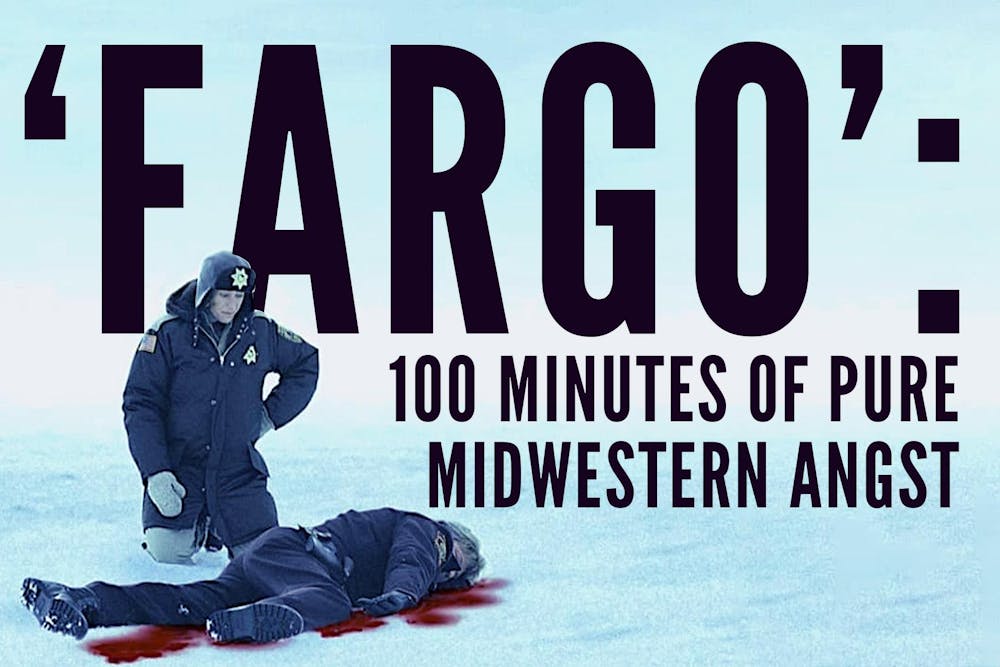The Browning Cinema at the DeBartolo Performing Arts Center is screening the Coen Brothers’ “Fargo” (1996) this Thursday, Dec. 12 at 8:00 p.m., and if you’re a Sun-Belter — i.e., if this semester marked your first brush with snow — you really should take a break from studying for finals to see it.
Being Midwestern is about snow, of course, but it’s also about parking lots, grain silos, supper clubs, hockey teams and long underwear. It’s about seething resentment and simple pleasures. In “Fargo,” the Coen Brothers manage to distill all of that, the entire Upper Midwestern ethos, into a 100-minute thriller.
Set in Minnesota in the late ‘80s, Frances McDormand plays an incredibly pregnant homicide detective. It’s my favorite of her roles, and it won her the first of her three Academy Awards for Best Actress. I definitely prefer the lighter McDormand we get in “Fargo” compared to the stodgier, actor-y performances she gave in “Three Billboards Outside Ebbing, Missouri” and “Nomadland.”
Steve Buscemi (a dad at the end of his rope) and William H. Macy (a skittish professional criminal) both make great leading men in their own peculiar ways, and Harve Presnell (Buscemi’s unfeeling father-in-law) is able to disquiet me in the same subtle way that John Huston does in “Chinatown” as the wicked Noah Cross. Because it’s a Coen Brothers’ movie, all of the supporting cast — Macy’s wife and son, McDormand’s romantic admirer, Buscemi’s partner in crime, every witness and bystander — are well acted and smartly directed character actors.
I’m not a movie-crier, but the chat McDormand has with her husband at the end of the movie gets me every time. So does the “There’s more to life than a little money, you know” monologue — it’s the way she insists, “It’s a beautiful day!” while looking out of her windshield at the long, straight Midwestern highway stained white by road salt and black by dirty slush. Whenever I’m driving down an empty, snowy Midwestern street, I hear the “Fargo” score.
If you’ve already seen “Fargo,” you should watch the Coen Brothers’ “A Serious Man” too. It’s good for pretty much the same reasons (charming actors, smart direction, an enchanted picture of the Midwest, etc.), but unlike “Fargo” — which is about the Lutheran sort of Minnesotan — “A Serious Man” focuses on Midwestern Jewry.
Every once in a while, especially when “A Serious Man” comes up, critics slap the Coen Brothers with the label “misanthropic.” This is one of my least favorite stock comments in film criticism, and it always gets leveled against my favorite directors (e.g., Lars von Trier for “Dogville”).
Yes, “A Serious Man” is about bad things befalling imperfect people. But the real misanthropy isn’t that — i.e, it’s not on the part of the Coen Brothers. Rather, the real misanthropes are the critics who — while sticking the appellation on the Coen Brothers — willingly ignore the undeniable charm of their paradoxically charmless characters. It’s they who are cruel to the characters, not the Coen Brothers.
“Fargo” is about learning to love a world that sucks. “A Serious Man” is about learning to love a life that bones. When you watch them, you end up loving characters who might not deserve it. The Coen Brothers get it — sometimes, that’s how Midwestern life feels.










